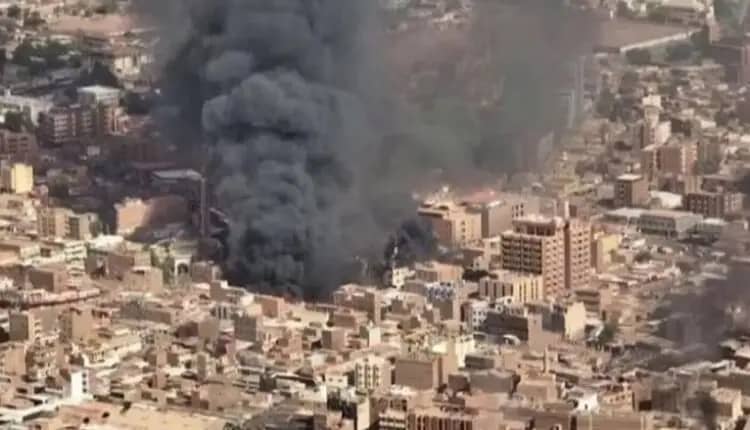Khartoum Searches for Its Missing as Families Hold on to Hope

Sudan Events – Agencies
Despite the Sudanese army’s release of around 4,000 civilian and military prisoners from detention centers and prisons run by the Rapid Support Forces (RSF) in the capital, Khartoum, tens of thousands remain missing. Their families continue to suffer psychological distress due to the mysterious disappearance of their loved ones since the war began nearly two years ago, especially following reports of numerous deaths inside these prisons.
According to human rights organizations, around 50,000 people have gone missing over the past 23 months, with no clear evidence indicating which party might be holding them. Nevertheless, their families remain hopeful, utilizing all available means to find them. Social media platforms are flooded with posters and pleas for help, displaying photos of the missing along with their families’ contact numbers, amid the suspension of police work since the outbreak of the conflict.
Shocking Realities
The Sudanese Group for the Defense of Rights and Freedoms reported that 50,000 people have been documented as missing since the war erupted in April 2023. The majority of the missing are from conflict-affected states, including Khartoum, Sennar, White Nile, and the Darfur region.
The group anticipates shocking and unforeseen revelations regarding violations against women and children, including acts of sexual violence, once the war ends.
They noted that communication blackouts and the difficulty of accessing conflict zones controlled by RSF forces hinder the documentation of all cases of enforced disappearance, suggesting that the real numbers could be significantly higher in those areas.
Anxiety and Fear
Magda Moatasem, whose son Shaker went missing three months into the war, recounted:
“My son used to work at a shop in old Omdurman. For over 60 days, he would leave in the morning and return in the evening regularly. One day, he didn’t come home. We tried calling him, but his phone was off. As time passed, we became increasingly worried, and by nightfall, we knew something was wrong. We searched police stations and hospitals, but to no avail.”
She added tearfully, “My heart is torn with fear and worry about my son, especially since his name wasn’t among those freed by the Sudanese army after retaking parts of Khartoum. Their names were published on social media, but he wasn’t among them.”
Psychological Impact
Salem Al-Tahir, a resident of Al-Jarif West, said his family lost contact with his 26-year-old brother over a year ago. He had left to get medical tests done due to his diabetes and never returned.
His parents are now in a devastating psychological state.
“We held onto hope,” he said. “But the fact that he wasn’t among those released from RSF prisons in Khartoum was a major shock. We’ve come to accept that he may have been killed.”
He added, “Sudanese families are suffering from severe psychological trauma due to the disappearance of their loved ones and the uncertainty of whether they are alive or dead, with no way to contact them.”
Violations and Tragedies
Sadiq Ali Hassan, Chairman of the Darfur Lawyers Commission, said:
“The list of detainees released in Khartoum State and the Jebel Aulia locality provided some answers about the fate of hundreds of missing persons and revealed hidden tragedies surrounding their disappearance.”
He added, “The RSF bears responsibility for the violations against detainees and forcibly disappeared individuals, as these incidents occurred in areas under its control in Khartoum, Al-Jazira, and El Geneina. Several deaths were also recorded inside the prisons.”
Disappearance of Doctors
Meanwhile, the Preparatory Committee of the Sudanese Doctors Syndicate expressed deep concern over the fate of five doctors who have been held by the RSF since October 2024.
The committee called on international organizations, including the World Health Organization and the International Committee of the Red Cross, to urgently intervene and secure the doctors’ release.
The committee also reported that in March, an armed group in Ed Daein, the capital of East Darfur, kidnapped a doctor from his home and took him to an unknown location. In response, healthcare workers at the hospital and local clinics went on strike and held a protest.
Complexities and Overlaps
Rahab Mubarak, a member of the Emergency Lawyers Committee, described the issue of missing persons in Sudan’s war as “complex and entangled,” due to multiple overlapping factors related to the search, investigations, and sample collection.
She highlighted the discovery of mass graves in northern Khartoum and Bahri, as well as dozens buried in open spaces and in front of homes.
“There are still hundreds missing despite the release of thousands of prisoners in Khartoum State,” she said. “Many others died in the streets, and some bodies decomposed and were buried without being identified.”
Mubarak also noted that the committee lacks accurate statistics on the number of missing persons in the capital due to months-long communication outages in several areas.
Source: “Sudanese Echoes”



